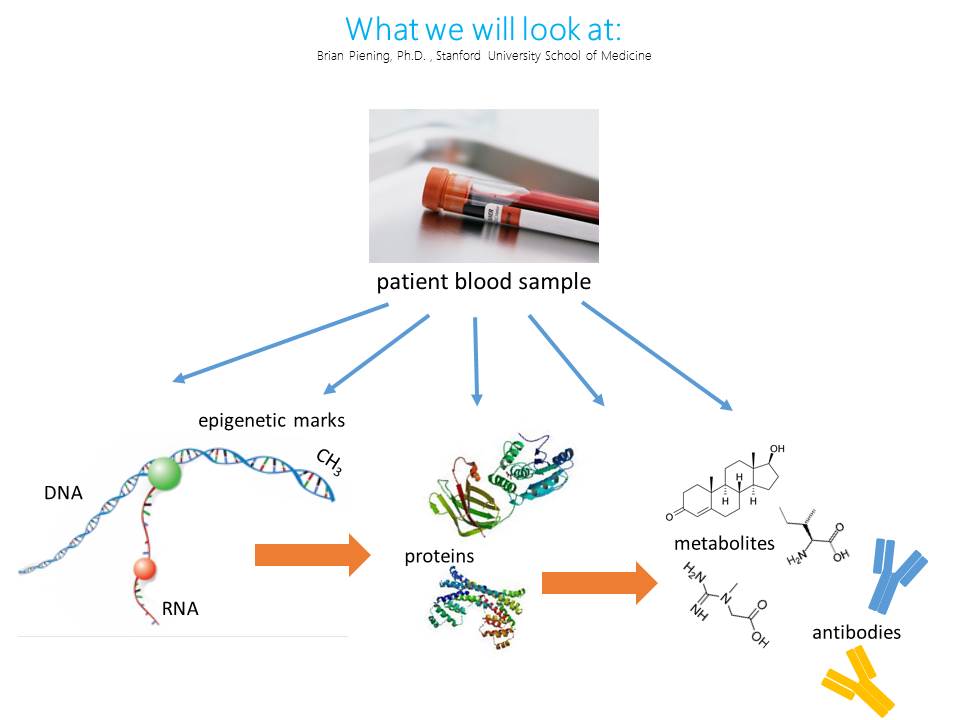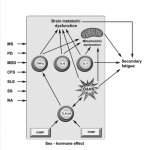Science is about coming up with a theory and proving or disproving it, which allows us to come up with better theories and proving or disproving themIn Dr Byron Hyde's definition of ME, he writes:
I wonder how this can be squared with Dr Davis' finding that the ongoing disease cause is "something in the serum."
You are using an out of date browser. It may not display this or other websites correctly.
You should upgrade or use an alternative browser.
You should upgrade or use an alternative browser.
A few theories based on recent findings
- Thread starter AdamS
- Start date
Jesse2233
Senior Member
- Messages
- 1,942
- Location
- Southern California
Where do proinflammatory cytokines fit in with "something in the serum"? Are they a possible candidate or are they too small?
Where do proinflammatory cytokines fit in with "something in the serum"? Are they a possible candidate or are they too small?
They are in the right size range. Their action is very local however and what spills over into the blood doesn't in any way reflect what is going on at the site of action. I find it hard to imagine they could be a serum factor(s) which is a disease effector.
JollyRoger
Senior Member
- Messages
- 138
They also found low ATP production in Depression but these patients have no PEM or "our symptoms".
http://www.ei-resource.org/news/men...be-caused-by-poor-cellular-energy-production/
I guess that mitochondrial dysfunction is just another side effect of cfs.
No one even knows the cause of PEM.
I hope someone knows it better than me.
Ps: I found this picture in an article about fatigue in autoimmune diseases.
http://www.ei-resource.org/news/men...be-caused-by-poor-cellular-energy-production/
I guess that mitochondrial dysfunction is just another side effect of cfs.
No one even knows the cause of PEM.
I hope someone knows it better than me.
Ps: I found this picture in an article about fatigue in autoimmune diseases.
Attachments
@A.B.
Agreed, just looking at the key serum contents, one thing stands out to me: Antigens
I'm of the opinion that it is some kind of large antigen/molecule which triggers the initial insult/response and then on a very basic level the antibody/antibodies produced as a result of this antigen mean that every time we exert ourselves we trigger an immune response/cascade of reactions which leave us feeling terrible. All speculation of course, but that is my educated guess.
The antigens/molecules which can trigger immune responses and activate lymphocytes are called immunogens apparently.
>> EDIT: On reflection my comment about antigens is probably way off. I'm gunna leave it on here but it could be complete nonsense so i'd probably ignore it. As many have already said, best to leave it to the experts
Great minds think alike. Do you know if Davis has tested the blood for any of these?
You think that everyone with the disease has been exposed to this same mysterious antigen?
Yes, as long as Davis hasn´t already tested for and excluded it.
Jesse2233
Senior Member
- Messages
- 1,942
- Location
- Southern California
They are in the right size range. Their action is very local however and what spills over into the blood doesn't in any way reflect what is going on at the site of action. I find it hard to imagine they could be a serum factor(s) which is a disease effector.
Where are they generally local to?
My understanding is that they can have systemic effects including crossing the BBB, causing mitochondrial dysfunction, and sickness behavior
Great minds think alike. Do you know if Davis has tested the blood for any of these?
I would have thought so, testing is ongoing though. This is from the OMF website:

No one even knows the cause of PEM.
You might be interested in the work of Alan Light & collegues, they've found some interesting stuff in relation to PEM:
http://www.sciencedirect.com/science/article/pii/S088915911730051X
https://www.healthrising.org/blog/2...cfs-post-cancer-fatigue-share-common-pathway/
JollyRoger
Senior Member
- Messages
- 138
Thx...
I found this interesting study:
Https://www.healthrising.org/blog/2...-fibromyalgia-chronic-fatigue-syndrome-mecfs/
----->
It’s not that the mitochondria are not involved – they are – but they’re not getting whacked by a problem that they have. They’re getting whacked by the neuroinflammation and oxidative stress that’s present. The general outlines of Shungu’s model don’t appear to be that far from Naviaux’s, Davis’s and Fluge and Mella’s models that something in the blood is turning off the mitochondria in the cells, and according to Shungu and Fluge/Mella is also affecting the blood vessels and blood flows. Again, that something for Shungu, is oxidative stress and neuroninflammation.
------
My theory:
Neuroinflammation happens in Burnout Syndrome, Major depression.
Low Atp is also present in diseases like depression.
So the culprit is maybe the oxidative stress.
There was a case in Spiegel (famous magazine in Germany) of a student with major depression caused by a neuroinflammation. After treating a chronic sinusitis he was healthy again.
The experts called it “sickness behaviour” (i think i already heard this term )
)
And can be caused by for example an inflamed tooth root or problems with the gut or even a flu. (When you are sick you don’t wanna make party; you just wanna sleep and silence)
I found this interesting study:
Https://www.healthrising.org/blog/2...-fibromyalgia-chronic-fatigue-syndrome-mecfs/
----->
It’s not that the mitochondria are not involved – they are – but they’re not getting whacked by a problem that they have. They’re getting whacked by the neuroinflammation and oxidative stress that’s present. The general outlines of Shungu’s model don’t appear to be that far from Naviaux’s, Davis’s and Fluge and Mella’s models that something in the blood is turning off the mitochondria in the cells, and according to Shungu and Fluge/Mella is also affecting the blood vessels and blood flows. Again, that something for Shungu, is oxidative stress and neuroninflammation.
------
My theory:
Neuroinflammation happens in Burnout Syndrome, Major depression.
Low Atp is also present in diseases like depression.
So the culprit is maybe the oxidative stress.
There was a case in Spiegel (famous magazine in Germany) of a student with major depression caused by a neuroinflammation. After treating a chronic sinusitis he was healthy again.
The experts called it “sickness behaviour” (i think i already heard this term
And can be caused by for example an inflamed tooth root or problems with the gut or even a flu. (When you are sick you don’t wanna make party; you just wanna sleep and silence)
ATP is one of the nucleotides which can mediate purinergic signalling too and from what I understand purinergic signalling is a pretty hot topic currently in the ME/CFS world. It regulates things like vascular tone in the endothelium of blood vessels and has a role in vasodilation. Additionally it apparently plays a role in calcium mobilisation (possibly in immune cells?) too.
I think large increases in extracellular ATP may be linked to Naviaux's Cell Danger Response. To be honest though that's about as far as my knowledge goes, i'm sure someone with more knowledge on the subject will put me right!
Either way, I think the problem is that the healing cycle is broken in ME and if we can work out what is blocking our energy from being produced effectively perhaps we can fix it.
I think large increases in extracellular ATP may be linked to Naviaux's Cell Danger Response. To be honest though that's about as far as my knowledge goes, i'm sure someone with more knowledge on the subject will put me right!
Either way, I think the problem is that the healing cycle is broken in ME and if we can work out what is blocking our energy from being produced effectively perhaps we can fix it.
ljimbo423
Senior Member
- Messages
- 4,705
- Location
- United States, New Hampshire
So the culprit is maybe the oxidative stress.
I couldn't agree more! I think that LPS are the primary cause of the initial oxidative stress, which then snowballs once the mitochondria become dysfunctional. Why don't LPS show up in the blood of cfs patients then? I think one reason could be that they stay at low levels until we exercise or exert ourselves enough. Here is a quote from a study-
There was also a significant difference in clearance of specific bacterial phyla from blood following exercise with high levels of bacterial sequences maintained at 72 hours post-exercise in ME/CFS patients versus clearance in the controls.
These results provide evidence for a systemic effect of an altered gut microbiome in ME/CFS patients compared to controls. Upon exercise challenge, there were significant changes in the abundance of major bacterial phyla in the gut in ME/CFS patients not observed in healthy controls. In addition, compared to controls clearance of bacteria from the blood was delayed in ME/CFS patients following exercise.
These findings suggest a role for an altered gut microbiome and increased bacterial translocation following exercise in ME/CFS patients that may account for the profound post-exertional malaise experienced by ME/CFS patients.
That high level of bacterial sequences verses controls, 72 hours post exercise, I find very, very intriguing. That often correlates with the worst part of PEM! 72 hours is three days.
LINK
I couldn't agree more! I think that LPS are the primary cause of the initial oxidative stress, which then snowballs once the mitochondria become dysfunctional. Why don't LPS show up in the blood of cfs patients then? I think one reason could be that they stay at low levels until we exercise or exert ourselves enough. Here is a quote from a study-
That high level of bacterial sequences verses controls, 72 hours post exercise, I find very, very intriguing. That often correlates with the worst part of PEM! 72 hours is three days.
LINK
Who has claimed that they don´t show up? They did in the Hanson study. I think though that you are right about the exercise part - I expect that if they test after exercise then there will be a much greater separation between patients and controls.
JollyRoger
Senior Member
- Messages
- 138
In his study he compares cfs with mella.
Here's a case with a patient who was primary diagnosed with cfs.
The symptoms all the same even PEM.
What's lps
Here's a case with a patient who was primary diagnosed with cfs.
The symptoms all the same even PEM.
What's lps
Last edited:
ljimbo423
Senior Member
- Messages
- 4,705
- Location
- United States, New Hampshire
They did in the Hanson study
That's right they did show up in the Hanson study, I forgot about that.
ljimbo423
Senior Member
- Messages
- 4,705
- Location
- United States, New Hampshire
What's lps
LPS, stands for lipopolysaccharides. They come from the cell wall of gram negative bacteria. They can escape through a hyper-permeable gut (leaky gut) and cause immune system dys-regulation.
ljimbo423
Senior Member
- Messages
- 4,705
- Location
- United States, New Hampshire
What's lps
I forgot to mention that they also cause increased oxidative stress, through their effect on the immune system. This ties in with a point you made in an earlier post.

